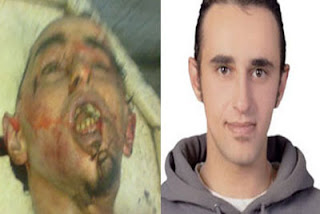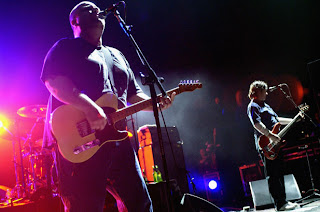THE ASSOCIATED PRESSIsrael remains defiant, seizes Gaza-bound aid shipJune 5, 2010
KARIN LAUBJERUSALEM — A defiant Israel enforced its 3-year-old blockade of Hamas-ruled Gaza on Saturday, with naval commandos swiftly commandeering a Gaza-bound aid vessel carrying an Irish Nobel laureate and other activists and forcing it to head to an Israeli port instead.
The bloodless takeover stood in marked contrast to a deadly raid of another Gaza aid ship this week. However, it was unlikely to halt snowballing international outrage and demands that Israel lift or at least loosen the devastating closure that confines 1.5 million Palestinians to a small sliver of land and only allows in basic humanitarian goods.
For now, the confrontations at sea are likely to continue.
The organizers of Saturday's sail said they planned to dispatch as many as three more ships in coming months and that four captains already have volunteered for the missions.
"What Israel needs to understand is that nothing is accomplished with force," said Greta Berlin of the Cyprus-based Free Gaza group, which sent the latest aid vessel, the Rachel Corrie.
Israel said it would block any attempt to reach Gaza by sea, in order to prevent weapons from reaching the Iranian-backed Islamic militant group. "Israel ... will not allow the establishment of an Iranian port in Gaza," Prime Minister Benjamin Netanyahu said.
At the same time, Israel signaled Saturday it is considering easing the blockade, although officials provided no details. Israel and Egypt closed Gaza's borders after Hamas seized the territory three years ago from Western-backed Palestinian President Mahmoud Abbas.
Saturday's takeover of the 1,200-ton ship was over in minutes.
After trailing the vessel for six hours across the Mediterranean, Israeli commandos boarded it from speed boats around noon, in international waters about 20 miles (30 kilometers) from Gaza, and forced it to sail to the Israeli port of Ashdod.
Footage from an Israeli aircraft showed the passengers sitting quietly in two rows on the top deck. A man described by the Israeli military as the captain got up, raised his arms and walked toward the soldiers.
The military said the crew of the Rachel Corrie dropped down one of the ship's ladders to make it easier for the forces to board.
The activists could not be reached to describe the events because communication with the ship was cut during the operation. Berlin called the takeover an outrage.
The 11 passengers and eight crew members will be deported, although those who object will be detained and given a chance to appeal, officials said.
Those aboard included Mairead Corrigan, who won the 1976 Nobel Peace Prize for her work with Catholics and Protestants in Northern Ireland, and the former U.N. humanitarian coordinator in Iraq, Denis Halliday.
While in radio contact, the Israeli navy officers addressed the boat as "Linda" — the vessel's name before it was renamed for an American college student crushed to death by an Israeli army bulldozer during a 2003 Gaza protest.
Saturday's nonviolent operation came nearly a week after a chaotic takeover of a six-ship flotilla by Israel, also in international waters. In that confrontation, Israeli forces rappelled from a helicopter onto the deck of the Turkish lead ship, clashed with club-wielding activists awaiting them and at some point opened fire.
Eight Turks and a Turkish-American were killed, and a preliminary autopsy report released by Turkey Saturday said they were shot a total of 30 times. Of the nine, five were shot in the head and back, and one was shot from close range, the report said.
Israel said its forces acted in self-defense against what it described as Islamic extremists.
However, the outcry over the aid ships has been a public relations nightmare for Israel, while giving Hamas a welcome boost.
Northern Ireland's deputy First Minister Martin McGuinness said Saturday the Rachel Corrie should have been allowed to reach Gaza "without Israeli aggression." In Stockholm, the Swedish dockworkers' union said it would persuade members not to service Israeli ships for a week, starting June 15.
In Tel Aviv, a demonstration marking the 43rd anniversary of Israel's occupation of the West Bank and Gaza turned into a protest against the blockade. "The government is drowning all of us," a sign read. Another protest by thousands in Paris included a large parade-style float representing an aid ship.
The United States, Israel's closest ally, on Friday joined other nations in saying the blockade in its current form is not sustainable. An infuriated Turkey said it would minimize relations with Israel, once a close regional ally.
The blockade, meant to dislodge Hamas, initially enjoyed the tacit support of many in the international community. Under the restrictions, Israel bars virtually all exports and most imports, including construction supplies.
Critics say the restrictions have been counterproductive, strengthening Hamas, wiping out tens of thousands of jobs and hampering U.N.-led efforts to rebuild what was destroyed in Israel's war on Gaza 16 months ago.
Most commercial goods, along with cash and weapons, are now funneled through hundreds of Hamas-controlled smuggling tunnels under the Gaza-Egypt borders. With unemployment high, many Gazans cannot afford to buy the smuggled merchandise.
Israeli Cabinet minister Isaac Herzog told The Associated Press that Israel is talking to its allies about possibly easing the flow of goods to Gaza, but provided no details.
The Obama administration had adopted a gradual approach of persuading Israel to ease restrictions, but National Security Council spokesman Mike Hammer said Friday the U.S. was working "urgently" with Israel, the Palestinian Authority and other international partners to find ways to bring more goods into Gaza.
Israel fears steel and cement can be diverted by Hamas for military use but has said it is willing to allow in limited shipments if aid agencies take responsibility. Hamas and other groups have fired thousands of rockets and mortars on Israeli border towns in recent years.
The Rachel Corrie carried hundreds of tons of aid, including electric wheel chairs, medical supplies and cement. Israeli officials said the cargo was to be unloaded in Ashdod, and items permitted under blockade rules would be taken to Gaza by land. Cement could be shipped in if the U.N. takes delivery, officials said.
The Free Gaza group, which organized Saturday's sail and other attempts to break the Gaza embargo, said Saturday it was closing its Cyprus headquarters and relocating, but won't stop sending ships to challenge the blockade.
Israel has allowed ships through five times, but has blocked them from entering Gaza waters since December 2008.
The fate of the cargo of Monday's flotilla remained in limbo, apparently because of disputes between Hamas, the U.N. and the Turkish aid group that was the main sponsor over who should receive them in Gaza.
The Istanbul-based Foundation for Human Rights and Freedoms and Humanitarian Relief said it has no immediate plans to send more ships and is still trying to get back the vessels Israel had seized. All six vessels of Monday's flotilla remain in the Ashdod port.
*
Associated Press Writers Diaa Hadid in Jerusalem, Karoun Demirjian in Ashdod and Selcan Hacaoglu in Istanbul contributed to this report.
















